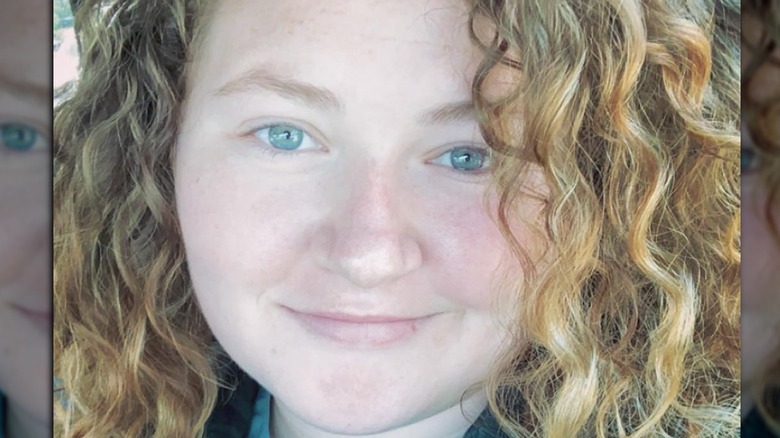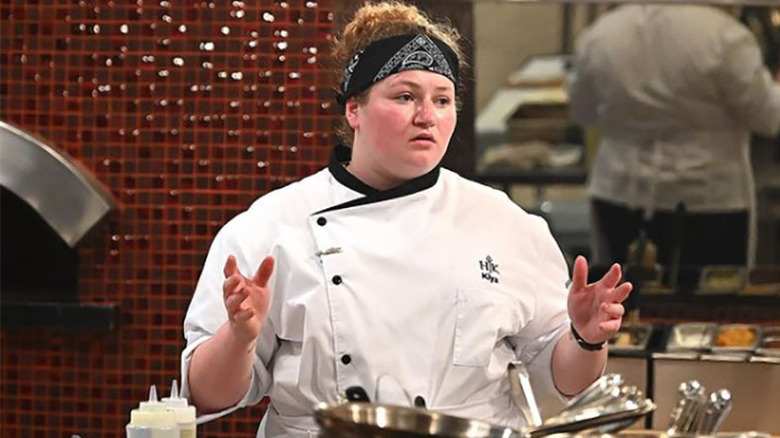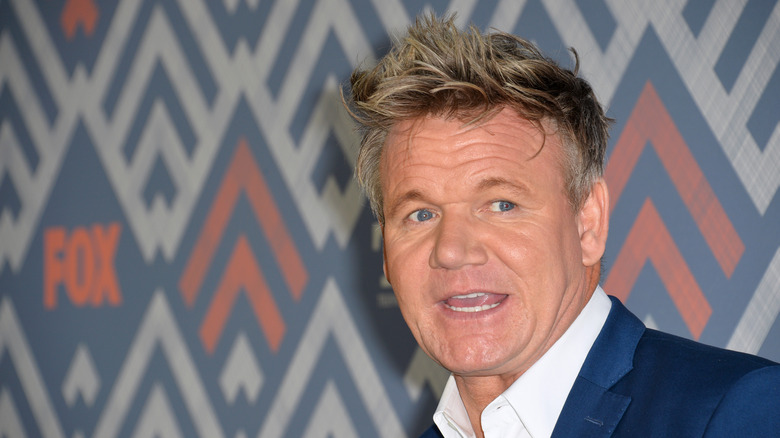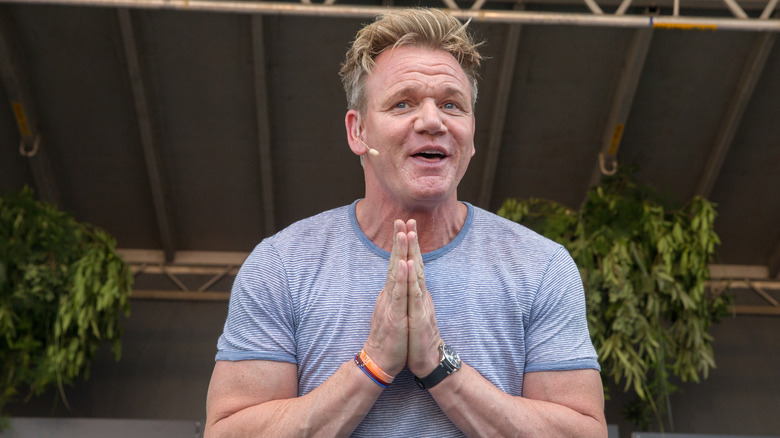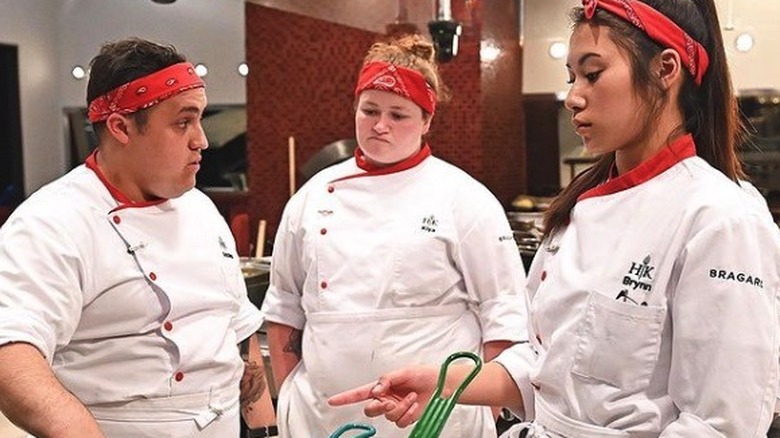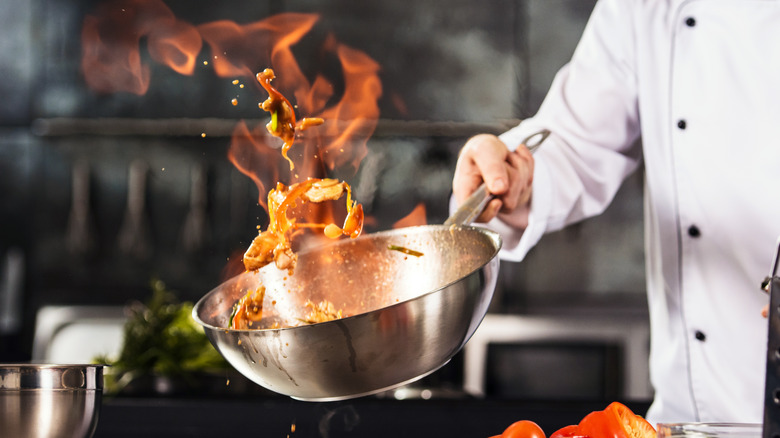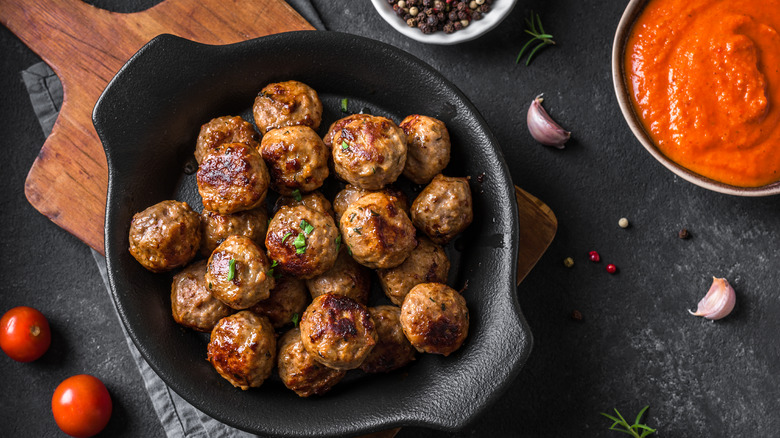Kiya Wilhelm Shares Her Real Experience On Hell's Kitchen - Exclusive Interview
Chef Kiya Wilhelm has been serious about cooking for more than half her life, having started when she was not yet 12 years old. If you do the math, that will tell you that at the time of this writing, Wilhelm is not yet 24 years old. (In fact, she's not quite 23, but you'll see why we pointed out that 24-year number soon enough.) She's at an age when most people pursuing a culinary career would be near the bottom of the kitchen pecking order, largely on the receiving end of orders if not shouts and curses from the chefs commanding the kitchen. However, thanks to one recent chapter in her young life, chef Kiya instead found herself commanding the attention not just of those around her in a kitchen but that of millions of viewers.
Wilhelm came near to winning season 20 of "Hell's Kitchen," a season subtitled "Young Guns" as none of the competitors on the show were more than 24 years of age. (See? There it is!) Finishing the show in 3rd place — she came up short of victory by a single point, she shared during an interview with Mashed. The young chef is nonetheless hoping to make the most of her time on TV and her experience competing against other aspiring young chefs and learning from luminaries of the culinary world like the inimitable Gordon Ramsay.
Though her exact culinary career path is still taking shape, chef Kiya has taken a great leap down the road thanks to "Hell's Kitchen."
For Chef Kiya Wilhelm, an interest in cooking stemmed from her family
When did you first start cooking, what interested you about it, and when did it become clear that cooking was going to be more than just a hobby for you?
So I started cooking when I was 11, 12, probably. My dad's been president of the bar that I bartend and cook at now for, I bet easily 35 years. And there was a bartender there that decided to ask my dad, "Hey, she seems to want to start cooking stuff. We have wings specials and steak sub specials. Would you mind if we let her do it?" And he, for some reason, said okay. So at 11 and 12 I was in a restaurant setting, cooking for, I'd say, about 20 people to 30 people at a time.
The older I got, the more I realized that I had my hand in the pot of so many different things. I was really good at art, really good at math, really good at technology, drawing out schematics and all that. And I was still choosing to cook for fun. Then obviously when it came time to decide a career path, I'm like, "Well, I can't imagine sitting behind a desk all day. I can't imagine ... being stuck basically." And that's when I was like, "Cooking seems to be the best fit for me, so I might as well just roll with it."
Who and what were some of your early culinary inspirations?
Oh my Grandma Babe, for sure. My mom's mom. My mom is in a generational stint where you cook for your husband. You make sure that there's food on the table every night when he comes home for dinner. My grandma was the same way. My dad's mom was the same way. It's very common around the area that that's what's done. It's still in the mindset that women are supposed to do that.
I saw them cooking every day. I saw them making things from scratch, pulling out books, cookbooks that were falling apart, books that they had made themselves with recipes that they found. And that was the earliest inkling of watching and being interested in the cooking side. And my mom's always been interested in watching Food Network, and I really enjoyed watching Mario Batali and Anne Burrell on "Iron Chef." I loved watching Masaharu Morimoto. Just basic things that my mom watched. That's where I started getting into the culinary world.
Kiya Wilhelm's surprising journey to Hell's Kitchen
What motivated you to try out for "Hell's Kitchen"?
So when I was going to school at AI in Pittsburgh — this was right before it shutdown, right before the school stopped existing — they would send working opportunities tailored to what your major was. And a lot of times it was stuff for a private chef, caterer, or even a serving job at a local restaurant where they needed help. And all of a sudden, one day a thing came up: "Chefs wanted for Season 19 and 20 of 'Hell's Kitchen.'" So I was like, "Okay, well, this is probably fake." Who knows, you know? And I went home and I asked my dad, I was like, "If I were to do this and apply for this and make it, would I be able to get the time off?" And nobody believed I'd be able to do it, or get on it even. And then lo and behold, I got on it.
What were your first thoughts when you realized that you would be on the show?
So we didn't know that we were on the show until the day of. They kind of kept us in the gray area until the final day. So we kind of half [suspected but] they were basically telling us that we had a chance to be on the show, but there was one final interview. I didn't find out that I was on the show until ... in the first episode, the curtain dropping, and chef Ramsay standing up there. We all thought that we had to go through one more interview. And at the time, because of all the people, I was very nervous because it was a whole bunch of reporters and stuff, or supposedly it made it look that way. And then chef Ramsay [is] standing up there. So I was extremely nervous and I was trying to not throw up. Because, how often does a curtain drop and then boom! There's one of your idols, like standing there watching you?
Kiya Wilhelm found Gordon Ramsay to be a nurturing mentor
How did the experience on the show meet your expectations and what were some of the biggest surprises?
The biggest surprise was for me, the one that really threw my mind, [was] the "This is what actually happens in this kind of world" thing was the quality of the food. A lot of times you look on TV and, for example on "Chopped," a lot of that stuff's random stuff that you can find, but it's stuff that you don't see every day. Whereas on "Hell's Kitchen," it was the finest cuts of meat. The Tomahawk [steak], for example. That was, I would imagine it's a hundred and some dollars just for that single steak. That's why it was shared between two people.
And that was the biggest shock for me, because I come from a home where you take the trimmings and you cut up or grind up the pig tongue and it's made into pudding or whatever. Everything's used, and it's the cheap cuts that can sometimes make the nicest things. Whereas on "Hell's Kitchen," it was the nicest cut is the cut. There is no other cut there.
What was it like working with Gordon Ramsay?
I get that question so often. A lot of people say, "Is he really that much of an ass?" I don't believe him to be one. I gel really well with an abrasive type of personality. I'm an abrasive type of personality myself. I have so much more admiration for the man now, because what they don't really show in the season is how nurturing he was to us. He showed us how to do things a better way or a more correct way that would make more sense, or that [could] make cooking time easier on us. And if we were struggling with something, he took the time to sit there and show you, "No, this is how I want you to do it because this way is easier."
And I think that that's one thing that the season faltered at, is that ... we're in that in-between age. We're not too young and we're not too old. We're not so young that we shouldn't know what we're doing, and we're not too old to where we're supposed to know everything. So he kind of gelled us, molded us into helping us in a way get to the final product rather than just expecting it to be right.
Kiya Wilhelm's hardest challenge on Hell's Kitchen and life after the show
What were some of the biggest challenges on the show?
The biggest challenge for me was getting out of my own head. Everything else, I'm a very go with the flow type person. And I knew that I would be my own worst enemy in the end. Obviously, I lost by one point and that was because of my dishes, not because of anybody else's. My dishes just weren't good enough. My biggest challenge was realizing that it was on me to do my best, and push through that way, rather than rely on somebody else to do worse.
How do you anticipate your time on "Hell's Kitchen" is going to affect the next chapter of your life?
So far, it hasn't affected much. The biggest difference is that people recognize me more often now. And it's really not that many, because I come from such a small town. It's only when I branch out into bigger cities, like my sister lives in DC and there was a couple of people that noticed me down there. As far as furthering my career, it hasn't done much. Because again, there's not much around here. I'm attempting to branch out to some things. I'm hoping that people that I reach out to will see from the show that I did well and I have a hunger to learn, and I want to do more. And that's pretty much all I can expect.
The kitchen tips Kiya Wilhelm has learned so far
What are some common mistakes that amateur chefs tend to make?
I'm an amateur myself! [But] on the show I [learned] a lot. One of the biggest things was keeping pans hot. A lot of places that you cook in around here — I'm speculating because I haven't worked in every place around my hometown — but a lot of places don't keep pans hot. They go from a shelf to the stove and you just warm it up that way. On "Hell's Kitchen," the biggest thing was [Gordon Ramsay] wanted was for you to keep the pans up amongst the burners where the exhaust was coming off of the ovens. And that kept a residual heat in the pan. It cut the time in half for getting a pan hot to sear something. I never expected that. I didn't really think about it. I don't know if a lot of people do or not.
And then another thing was preparation. So, food prep, in general, is always a big thing in the kitchen. On "Hell's Kitchen," it's very minimal. The biggest thing that is prepped is the garnish station. And I didn't realize that that was a thing at all. I know around my town and from places that I've worked in, you prep as much as you can and then you're just kind of like finishing it. The main thing is you're cooking the protein or you're cooking the meat, and then everything just kind of comes together at the end. On the show it was step-by-step. You needed everything fresh, and the last thing that was done was something like the vegetables were reheated, but they were cooked to order. And that's something that I had to get used to, was making sure that things were fresh. Not only day of prep, but an hour before prep.
What is your advice for people who want to take their cooking up a notch?
My biggest advice is, I always say this, but don't be afraid to try something. My sister claims that she's jealous of the fact that I can do anything without looking back. I don't live with many regrets. One of the biggest things is I chose to do a career that is clearly hard work. You work hours that people don't want to do and you are the responsible one during parties and stuff like that. You're making the stuff that people don't want to make for themselves. You're an at-hire employee for people that are attempting to have a good time.
Another thing that I really wish people would realize, for younger chefs, is that if you can find one with the hunger to learn, you better hire them immediately. Because if they show that they want to learn, imagine all that you can teach them. Myself included on the show, with a lot of other people from our season, I think that we took in — and it shows that we took in — so much knowledge just from being there the time that we were.
Kiya Wilhelm's favorite (and least favorite) things to cook
What is your favorite type of cuisine to eat? And what is your favorite type to cook, assuming they are different?
I really enjoy cooking Asian cuisine. I love the flavors and the oils that are used in Asian cuisine. For some reason, I've always been more inclined to eat Asian food. I also love to prepare Italian food and I think it's just because that's what I started out with. When I first started cooking, it was a lot of Asian food and Italian food. I was a prep cook at an Italian restaurant, and I was a cook in Ginger's Asian Kitchen, which I'm still helping out there now. But I think it's because it's what I started with. That's why I like to do those things so much.
Do you have a single favorite dish that you like to cook?
For some reason, I really like to cook ribs. I don't know if it's because it's one of those things that not many people can get right, but I like the fact that it takes so long, so you can watch it. You can see the progression as you cook it. And then the end result is rewarding because of how long it took to prepare something like that.
Is there a dish that you just hate making or one that you just think is overrated and you hate when people order it?
Meatballs. I think that the time it takes to make them is ridiculous. I think the whole hand-rolling part — and again, this might be because I worked in an Italian restaurant, so we were making 500 meatballs a week, and you usually did them in one day — I don't know if it's because it's so time-consuming and tedious that I hate them so much, but I wish that meatballs did not exist. I think they're ridiculous.
To keep up with chef Kiya Wilhelm's culinary career, you can follow her on Instagram.
